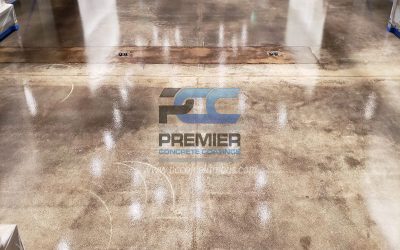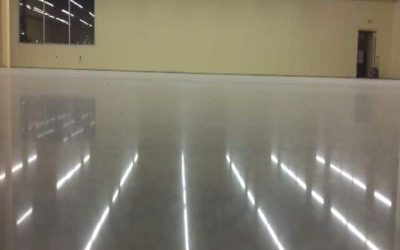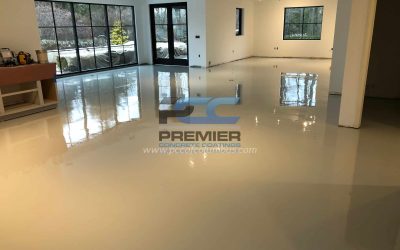Weather and ambient temperatures play a significant role in the final shine and staying power of a polyurea, polyaspartic, or your primer for epoxy.
As the leading provider of cost-effective protective compounds in Ohio, our technicians at Premier Concrete Coatings entertain hundreds of weather-related inquiries from residents and business owners every month. We have been dispelling many myths about how protectants react to cold temperatures, and our technicians outline four of them in this explainer. We also detail how you can benefit from hiring trained professionals for a basement flooring job in the winter instead of working off tutorials on YouTube and amateur blogs.
Low Ambient Temperatures Have a Negligible Effect on Primer For Epoxy Protective Coatings
The most prevalent myth remodelers and property owners believe is that low ambient temperatures cause epoxy, polyurea, and polyaspartic to cure faster, leaving little to no room for corrective measures and modifications. However, cold ambient temperatures and winter weather generally have zero effect on the drying times of protective coatings as long as you apply them in indoor areas. The best time to service decks, outdoor parking spaces, and pathways are during autumn when humidity is low.
Basements are indoor spaces with thermostats our technicians can control. Most primer for epoxy and polyurea coatings take longer to adhere or even refuse to perform outright when temperatures dip below 50 degrees Fahrenheit. However, as long as the temperature inside your basement remains warm enough for protectants to sit for a few hours without freezing, you are good to go.
Residential basements often have limited ventilation, and protectants release suffocating fumes upon application. Even though the products we utilize have little to no volatile organic materials, respirators and industrial fans are still necessary on every job site. Professional experience is essential when applying coatings on basement flooring, and we do not recommend it to DIYers for their first job.
Winter Weather Does Not Cause Bubble Formation
Many property owners are under the impression that because water vapor escapes the ground during hot summer days, applying a floor coating during the wintertime causes bubbles to form on their basement floors. The bubbles on primer for epoxy, polyurea, and polyaspartic coatings are a product of an aeration process that technicians call outgassing.
Brick, concrete, and most stone floors are porous, meaning they have millions of holes that moisture can penetrate. Outgassing occurs when one of these four things happens:
- Your contractors used air-entrained concrete to build your basement and incorporated too much air while mixing and pouring.
- Your concrete floors have been exposed to adverse weather for years before you applied a coating.
- Earthquakes and other seismic activity is causing cracks in the concrete under your basement, and gasses are seeping through it.
- Your concrete did not cure well, leaving a soft, punky texture.
Outgassing is not a structural problem but an aesthetic one. Coatings with popped bubbles might trap liquids, dirt, and debris, making cleaning and restoration time-consuming. It generally does not affect the integrity of a basement floor coat and is not caused by applying protectants during wintertime.
You Can Find a Contractor to Apply a Primer For Epoxy During Winter Faster
Winters are low-volume periods for flooring contractors as most people are away visiting family in nearby states or taking vacations in sunnier places like Key West and San Diego. Many property owners think setting up an appointment with a flooring expert would be more challenging during the holiday season, but technicians have more openings on their schedules.
We have served many customers from December to February and finished their brand-new floors in less than 24 hours. We love helping people start the new year with more durable and beautiful basements.
We get many last-minute calls from clients who have unexpected guests and family members coming over and want to use their basements as bedrooms and game rooms. They leave us multiple five-star ratings on independent websites, online forums, and review apps.
Protective Coatings Shield Basement Floors from Winter Equipment
Newly coated basement floors have higher tolerances for heavy foot and vehicle traffic.
We serve many clients with basement garages. Primer for epoxy, polyurea, and polyaspartic coatings shield their floors from scuffs and scratches from studded snow tires, mud stains, winter boots, and road salt. Anti-slip additives prevent them from slipping while walking with wet shoes.
Get Started on Your Winter Project Today
If you want to learn more about the benefits of applying a basement floor coat during wintertime, call our licensed technicians at Premier Concrete Coatings by calling (614) 918-7345. We will give you a free consultation and a no-obligation quote.



